
Why are we so obsessed with house plants?
Plants can bring life and colour into your home, but what other benefits can they have? In this article, we are going to explore 5 different house plants that can help with sleep. People often struggle with their sleep for a variety of reasons. You could suffer from insomnia[1], or perhaps a very busy and stressful work life which can make it hard to shut off for the evening, or perhaps your 8 hours of beauty sleep is interrupted by your partner’s snoring!
For whatever the reason, there are some very natural remedies that can help you get longer and better quality sleep. Read on for the definitive list of house plants that can help with sleep.
Can house plants help with mental health?
A lot of people can feel stressed, as a result of a busy work or home life, or perhaps as a result of the recent pandemic. As well as stress, a lot of people also experience mental health conditions. As many as 1 in 4 people[2] in today’s society suffer from mental health conditions, such as depression and anxiety.
This number has even gotten worse since the Covid-19 pandemic, with now on average 56% of 18-24 year olds[3] report symptoms of anxiety and/or depressive conditions. So how do house plants that can help with sleep come into this? Having something in your home to both care for and receive the benefits of can improve your quality of life, here are a few of the benefits of having plants around at home:
- Improved air quality (Plants by nature improve the air quality by taking in all the carbon dioxide and pumping out oxygen for you to enjoy)
- Filtering toxins from the air (Some of the toxins in your house can come from the manufacturing process of your carpets and furniture, as well as from outside of your home – formaldehyde and benzene [4])
- Improved mood (Both from caring for a plant and having greenery in your home can have a knock on effect and improve your mood, being around nature can improve your dopamine and serotonin production).
Why does relieving stress help with sleep?
We can all feel stressed from time to time, whether that be because of a massive deadline at work, or perhaps a very busy home life. Whatever the reason, it can affect your sleep. Stress can lead to a lack of sleep, or restless nights, and a lack of sleep can lead to stress.
So how can we break this cycle? A few things you can do is make sure you spend enough time away from caffeine and screens in the evening. There are also a range of house plants that can help with sleep. There are also over the counter medications that are helpful in sleep remedy, you can also look into prescription options here.
Plants that can help you sleep
Lavender
(genus lavandula)
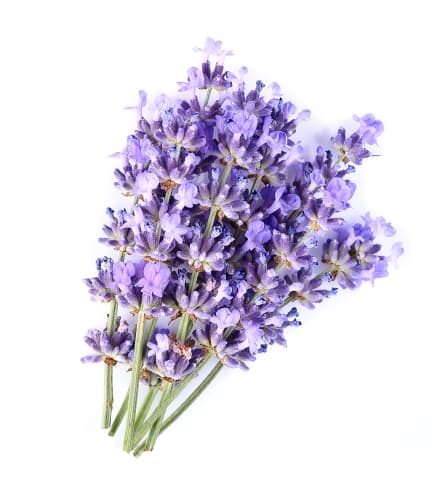
When you think of house plants that can help with sleep, you instantly think of lavender as a first option, and it’s for good reason, as a natural sleep remedy it dates as far back as the ancient Egyptians, Studies[5] have shown that inhaled lavender works by acting on the limbic system, releasing dopamine and causing you to feel relaxed and content. Consider keeping a pot of lavender next to your bed, not only does the smell help you to relax before getting a good night’s rest, it’s also a pretty colourful sight in the morning!
Snake Plant
(dracaena trifasciata)
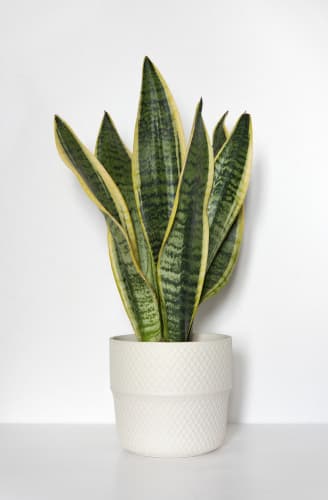
The Snake Plant (also known as mother-in-law plant), is a species of plant that according to NASA’s Clean Air Study[6] excels at producing oxygen, (even doing so at night!). This increased flow of oxygen can help your airflow at night and can help you sleep deeper. In the same NASA’s Clean Air Study[6], it was shown that the Snake Plant is extra effective at filtering out toxins such as benzene, formaldehyde, and xylene[4], often found in the furniture and carpets we purchase.
Gardenia
(genus gardenia)
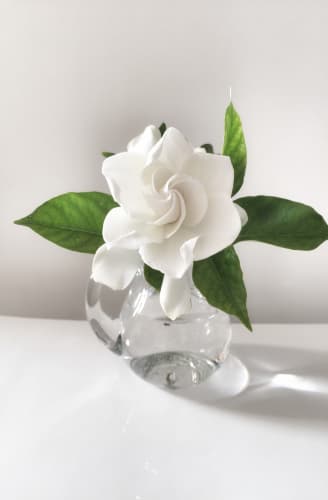
Other house plants that can help with sleep include the Gardenia. It is an ideal choice if you’re looking for a house plant that can help with sleep that also smells as great as it looks, often used in perfumes, skin care products and food. It also has amazing relaxation properties similar to Valium a study[7] indicated, gardenia scent can be as strong as a dose of Valium in helping you fall to sleep, working in the same way as the pharmaceutical drug to regulate excitement and leave you feeling ready for a great night’s rest.
Gardenia also has a range of other health benefits, and has been used in western medicine to regulate anxiety as well as other mental health conditions.
Spider Plant
(chlorophytum comosum)
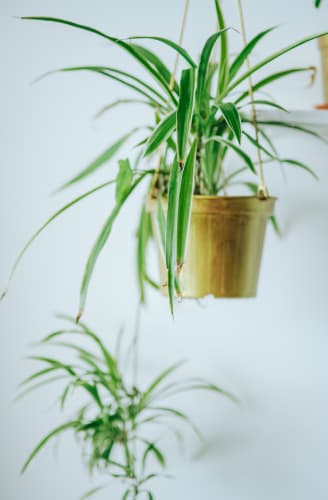
Spider plants are one of the best plants for both beginner and veteran plant keepers alike. With spider plants being one of the easier plant species to take care of, studies[8] show that nurturing plants can improve your mental health and reduce stress so it can feel very rewarding to watch the Spider Plant grow and develop. When you are less stressed, it can lead to better quality and longer sleep. Spider Plants also reproduce well, so the smaller offspring plants can make ideal gifts for family and friends.
Chamomile
(matricaria chamomilla)
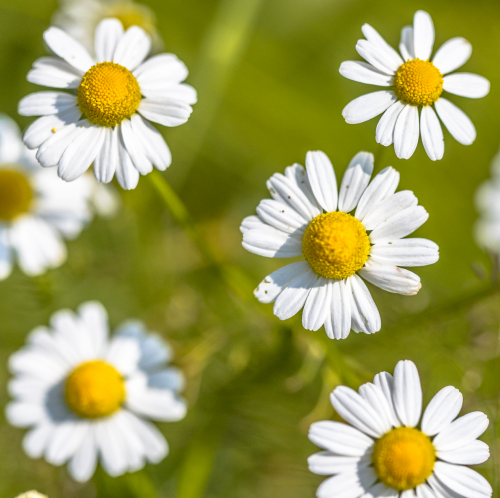
We are all familiar with Chamomile tea and its benefits for when you have a cold or a stomach ache, but did you know, having the flowers in your bedroom can help you sleep at night? The plants have a powerful aromatherapy effect and using them to smell before you lay down for the night can help you relax and reach that ideal 8 hours of good rest a night. They can also add to the colour palette of your room, meaning you wake up to a bright selection of plants to start your day off with some colour!
Other ways that house plants can help with sleep and reduce stress
Additional reasons for house plants that can help with sleep include just being out in nature. This can really improve your stress levels and help you to feel healthier and happier. Studies[9] into the benefit of spending time outside show that people who spend even up to 45 minutes outside each day feel happier than those who don’t. Spending time outside in nature can improve both your production of dopamine and serotonin as well as increase your intake of Vitamin D.
There are also other ways you can keep on top of stress, such as trying meditation, read up on how to Master Stress in 7 Easy Steps
Other treatments available to help with stress, sleep and anxiety
You may struggle with anxiety, you could consider taking Propanolol to assist with this and lower your stress levels. Some women may also struggle with night sweats due to menopause which can greatly affect the quality of sleep, Hormone Replacement Therapy can help reduce menopause symptoms such as hot flushes and night sweats.
We are also aware that it can’t be that simple for everyone, if you suffer from allergies, you can read our blog article about hypo-allergenic plants that can assist in your stress reduction, we also have a range of antihistamine products to help you keep on top of your allergies
 |
 |
|
Buy Propranolol Here
|
Sources
[1] NHS advice on insomnia | NHS
[2] Mind’s Mental Health Statistics | Mind
[3] The Implications of COVID-19 for Mental Health | KFF
[4] Exposure to benzene and formaldehyde in the European countries | PubMed
[5] Lavender and the Nervous System | PMC
[6] NASA Clean Air Study | Wikipedia
[7] Intoxicating fragrance: Jasmine as valium substitute | ScienceDaily
[8] What Houseplants Can Do for Your Lockdown Health | VeryWellMind
[9] How Many Minutes Per Day Should You Spend Outside | InsideHook
Further Reading
- 6 Plants that induce sleep | Planteria Group
2. 11 Bedroom plants that help you sleep | Dreams
3. Plants that help you sleep | Pro Flowers








